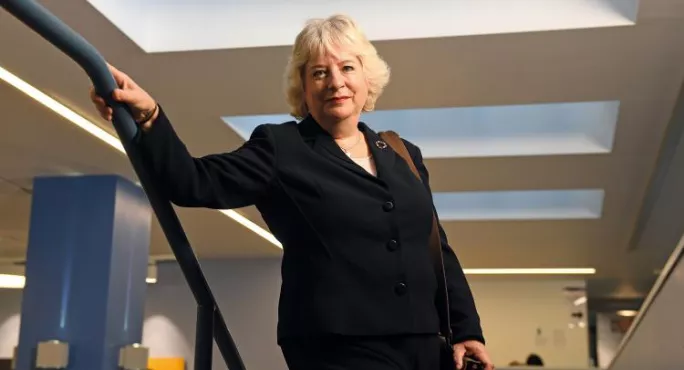Dame Peacock: DfE Covid ‘U-turns’ let teachers down

School leaders and headteachers were “let down” by “U-turn after U-turn” on the part of the government during the pandemic, a teacher leader will tell the UK Covid public inquiry.
Speaking to Tes, Dame Alison Peacock, chief executive of the Chartered College of Teaching (CCT), said the organisation will set out in evidence to the inquiry how the Department for Education (DfE) was “guilty of very poor communication with the profession” during the pandemic at a time “when they really needed guidance”, which left teachers isolated and at risk.
Her concerns will form part of the CCT’s submission to the UK Covid public inquiry in the next few months.
- Covid: Teacher lockdown drinks claim ‘deeply insulting’
- Related: How the government and the system failed schools during Covid
- Mental Health: Extra training cash won’t fix Covid mental health ‘catastrophe
Dame Peacock said that, while there wasn’t necessarily a lack of guidance from the department during the pandemic, it was often “contradictory” with “U-turn after U-turn”.
One example Dame Peacock gave was the decision to send schools back in January 2021 for one day before returning to virtual learning.
The CCT submission to the inquiry will also detail concerns that the teaching profession did not feel a “strong enough advocacy” from the DfE on behalf of schools in terms of funding.
Dame Peacock said that when schools returned after the lockdowns, funding was needed for the pupils coming back into classrooms for extracurricular and academic needs, as well as funding for teachers’ pay.
She added that the sector had needed “really strong leadership” and for the DfE to “spearhead those kinds of investments” .
Lack of urgency put teachers at risk
Dame Peacock said that more than 63 per cent of teachers who responded to CCT surveys said they felt their health had been “negatively affected” by the pandemic, whether that be mental or physical.
She said the Covid crisis was a “very scary” time for the profession.
“I was on call after call after call with the DfE” when colleagues were asking what advice they should be giving to pregnant women working in schools.
She said she went for weeks without an answer.
“Older teachers, who were more vulnerable because of their age, had to be really brave to be able to keep facing the challenges,” she added.
Teachers left in ‘isolation’
Dame Peacock said that “when you think about the lack of investment” for pupils, it was “really quite shocking” that teachers were expected to “just carry on”.
Surveys conducted by CCT at the time found that teachers were “incredibly worried about the wellbeing” of some pupils “who they would normally be keeping a close eye on”.
Dame Peacock also said comments such as those of MP Michael Fabricant - who accused teachers of drinking in staffrooms while Covid restrictions were in place - “smacked of a lack of understanding of the reality” of what it was like for schools.
She added that, during the pandemic, teachers and leaders were in “isolation”, making their job even more difficult.
Speaking from a personal perspective, Dame Peacock says her experience during the pandemic means she now avoids “anything that puts me on edge”, including TV dramas.
“It was such a traumatic time and I think, collectively, we’ve had a shock as a society - and teachers have to respond to all of that and they have to keep going.”
And now, Dame Peacock says, teachers are seeing pupils sitting formal exams for the first time in years, who “have experienced all kinds of trauma” through bereavement during the pandemic and yet they’re sitting an exam “as if everything is as it would normally be, and it isn’t”.
As a result, the transference of that anxiety is “being borne by teachers”.
The profession ‘stepped forward’
Despite feeling let down, Dame Peacock said she was “very proud of the way the profession stepped forward” in spite of the “confusing messages” schools were receiving.
She also felt that one positive to have come out of the past two years was that “relationships have been strengthened”.
Baroness Heather Hallett, who is chairing the inquiry, set out her terms of reference last week following a consultation, in which it was agreed to expand the inquiry to cover the pandemic’s impact on children and young people, and the mental health and wellbeing of the UK population.
The inquiry will get under way once the prime minister has agreed to its scope.
You need a Tes subscription to read this article
Subscribe now to read this article and get other subscriber-only content:
- Unlimited access to all Tes magazine content
- Exclusive subscriber-only stories
- Award-winning email newsletters
Already a subscriber? Log in
You need a subscription to read this article
Subscribe now to read this article and get other subscriber-only content, including:
- Unlimited access to all Tes magazine content
- Exclusive subscriber-only stories
- Award-winning email newsletters
topics in this article



